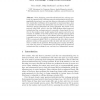Free Online Productivity Tools
i2Speak
i2Symbol
i2OCR
iTex2Img
iWeb2Print
iWeb2Shot
i2Type
iPdf2Split
iPdf2Merge
i2Bopomofo
i2Arabic
i2Style
i2Image
i2PDF
iLatex2Rtf
Sci2ools
136
click to vote
EUROCRYPT
2000
Springer
2000
Springer
Provably Secure Password-Authenticated Key Exchange Using Diffie-Hellman
Abstract. When designing password-authenticated key exchange protocols (as opposed to key exchange protocols authenticated using cryptographically secure keys), one must not allow any information to be leaked that would allow verification of the password (a weak shared key), since an attacker who obtains this information may be able to run an off-line dictionary attack to determine the correct password. We present a new protocol called PAK which is the first Diffie-Hellman-based passwordauthenticated key exchange protocol to provide a formal proof of security (in the random oracle model) against both passive and active adversaries. In addition to the PAK protocol that provides mutual explicit authentication, we also show a more efficient protocol called PPK that is provably secure in the implicit-authentication model. We then extend PAK to a protocol called PAK-X, in which one side (the client) stores a plaintext version of the password, while the other side (the server) only stores a ...
Cryptology | EUROCRYPT 2000 | Key Exchange Protocol | Password-authenticated Key Exchange | Protocol Called Pak |
Related Content
| Added | 24 Aug 2010 |
| Updated | 24 Aug 2010 |
| Type | Conference |
| Year | 2000 |
| Where | EUROCRYPT |
| Authors | Victor Boyko, Philip D. MacKenzie, Sarvar Patel |
Comments (0)

